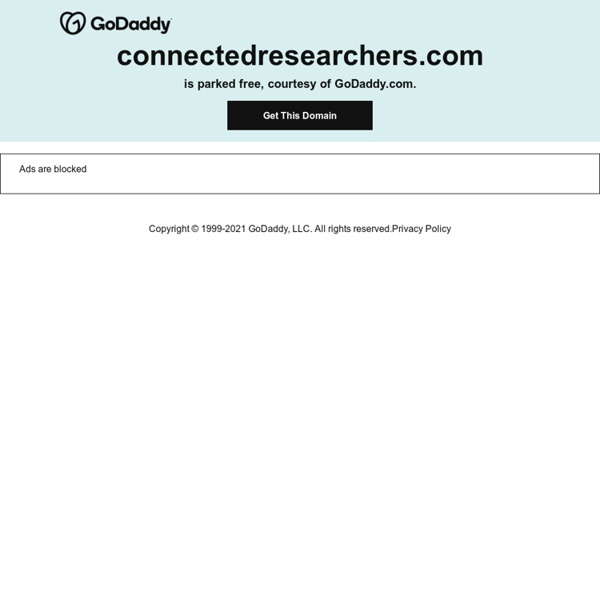Zoom
Trash



http://connectedresearchers.com/online-tools-for-researchers/
Related: RESEARCH • Researcher dashboardAre scientific theories really better when they are simpler? Two of Barcelona’s architectural masterpieces are as different as different could be. The Sagrada Família, designed by Antoni Gaudí, is only a few miles from the German Pavilion, built by Mies van der Rohe. Gaudí’s church is flamboyant and complex. Mies’s pavilion is tranquil and simple. Mies, the apostle of minimalist architecture, used the slogan ‘less is more’ to express what he was after. Gaudí never said ‘more is more’, but his buildings suggest that this is what he had in mind. Research4LifeFree Digital Tools for Researchers Could you imagine doing research without internet? Digital tools have made research practices easier for scientists and librarians. Here we have gathered for you some digital resources to help you conduct research more efficiently and creatively. 1.
Einstein's Zurich Notebook John D. Norton Center for Philosophy of Science Department of History and Philosophy of Science University of Pittsburgh This page at www.pitt.edu/~jdnorton/Goodies For more images and much more commentary on the Zurich Notebook, look here. Setting the Stage In the half century and more of Einstein's work in science, one discovery stands above all as his greatest achievement.
Professional Edition ELN - LabArchives Store, Organize, Share Laboratory Research Data The Professional Edition is for Principal Investigators, lab managers, post doctoral fellows and grad students. This edition will improve the productivity of research staff, finding information and recreating experiments. Try it. It's Free! or sign in Five top technology tools for the English classroom There are many educational technology tools available to use in your English classroom – and they're increasing at a rapid rate. Whether you're a seasoned tech classroom user or new to the idea, below are a few handy tools for you to get your teeth into. It's not an extensive list but these five are easy to use and a good introduction to what's available.
Getting Started - Systematic Review Program - LibGuides at Health Sciences Library System What is a systematic review? "A scientific investigation that focuses on a specific question and that uses explicit, planned scientific methods to identify, select, assess, and summarize the findings of similar but separate studies. It may or may not include a quantitative synthesis of the results from separate studies (meta-analysis) depending on the available data." IOM p 1. 10 Great Tools for Academic Research You Should Know about 1- Zotero Zotero is the only research tool that automatically senses content, allowing you to add it to your personal library with a single click. Whether you're searching for a preprint on arXiv.org, a journal article from JSTOR, a news story from the New York Times, or a book from your university library catalog, Zotero has you covered with support for thousands of sites. 2- Endnote EndNote gives you the tools you need for searching, organizing and sharing your research. It allows you to easily create bibliographies while writing your next paper with features like Cite While You Write .
Common Errors in English Usage Use the search form below to find words and phrases on this site. About this Search Engine E e.g. / i.e. each early adapter earmarks / hallmark earth, moon easedrop ecology / environment economic / economical ecstatic ect. Digital tools for researchers Find out how digital tools can help you: Explore the literature(back to top) Here is a collection of digital tools that are designed to help researchers explore the millions of research articles available to this date. Search engines and curators help you to quickly find the articles you are interested in and stay up to date with the literature. Article visualization tools enhance your reading experience, for instance, by helping you navigate from a paper to another. Search engines and curators
Best Online Research Tools You've Never Heard Of Is it possible to conduct research without Google? YES! In fact, it’s NECESSARY for college-level research. Google and other Internet search engines are great tools for researching the basics of any subject. However, when conducting research for accredited college courses, students need to find legitimate, trustworthy resources. Einstein v Newton: the final battle during a total eclipse Usually, when scientists test a theory, they get everything nicely under control. But in 1919, as the First World War was drawing down, the British astronomer and physicist Sir Arthur Stanley Eddington did not have that luxury. He was going to test Albert Einstein’s theory of relativity at a solar eclipse thousands of miles from the nearest precision laboratory. This was not easy. ‘In journeying to observe a total eclipse of the Sun, the astronomer quits the usually staid course of his work and indulges in a heavy gamble with fortune,’ wrote the young Eddington. For him, treacherous weather and war made true control even more difficult to attain.